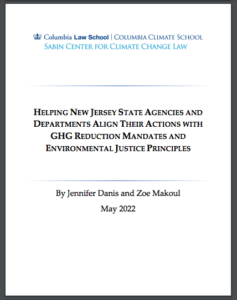By Jennifer Danis and Zoe Makoul,
The recently released Sixth IPCC Assessment Report describes a world suffering from the ramifications of climate change, disproportionately impacting our most vulnerable populations. The United States is no exception, and some states are taking the initiative to mitigate worsening climate impacts.
New Jersey has committed to reducing its greenhouse gas (GHG) emissions to meet the requirements set forth in the Global Warming Response Act (GWRA), but the state’s critical sectors have not adapted with the requisite speed to meet those limits. In Executive Order No. 23, New Jersey also committed to addressing the disproportionate impact of climate and environmental harms, but it has not operationalized its promise of environmental justice.
 In a new white paper, we analyze New Jersey’s implementation gap in both the climate and justice space and offer some key recommendations to align executive action with the state’s bold promises. The paper’s findings and recommendations are potentially applicable to the many other states who have set climate and justice goals without robustly embedding them into their existing legal and administrative landscapes.
In a new white paper, we analyze New Jersey’s implementation gap in both the climate and justice space and offer some key recommendations to align executive action with the state’s bold promises. The paper’s findings and recommendations are potentially applicable to the many other states who have set climate and justice goals without robustly embedding them into their existing legal and administrative landscapes.
While New Jersey has clearly recognized the urgency of meeting the GWRA’s GHG limits and fulfilling the promise of environmental justice, currently, Executive Branch agencies and departments are not assessing whether their actions actually align with those goals. Although there are certain procedural safeguards in place for agency rulemaking, none explicitly require assessment or disclosure of whether the proposed rules are consistent with obtaining the state’s GHG reduction requirements. And apart from the Department of Environmental Protection, Executive Branch agencies and departments are not required to implement measures and adopt regulations to achieve the requisite GHG reductions. In addition to the GHG-related barriers, Executive Branch agencies and departments are encouraged, but not required, to assess whether their actions disproportionately impact communities of concern, nor are they required to center and operationalize environmental justice principles.
If New Jersey is to timely meet its GHG reduction goals in an equitable manner, legislation must mandate that Executive Branch agencies and departments align their actions and rulemaking with GHG-reduction and environmental justice goals. Our paper posits that these implementation issues can be addressed with minor changes to the GWRA and the Environmental Justice Law, and we propose legislative amendments modeled on recent laws adopted by New York, Maine, Washington, Rhode Island, Massachusetts, and other climate and justice leaders.
The state already has GHG reduction targets, a plan, and mapped pathways. While more aggressive tactics and targets may be required to meet evolving scientific knowledge, and cost-effective technology and markets will evolve over time, New Jersey’s climate-alignment tools and pathways are clear. Likewise, New Jersey has already done the work to promote environmental justice. Enacting an all-of-government, systematic approach to addressing both issues will ensure that these ongoing efforts yield legally durable results, capable of meeting the urgency of the moment.
Read the full paper here.
Tiffany is the Communications Associate at the Sabin Center for Climate Change Law.


